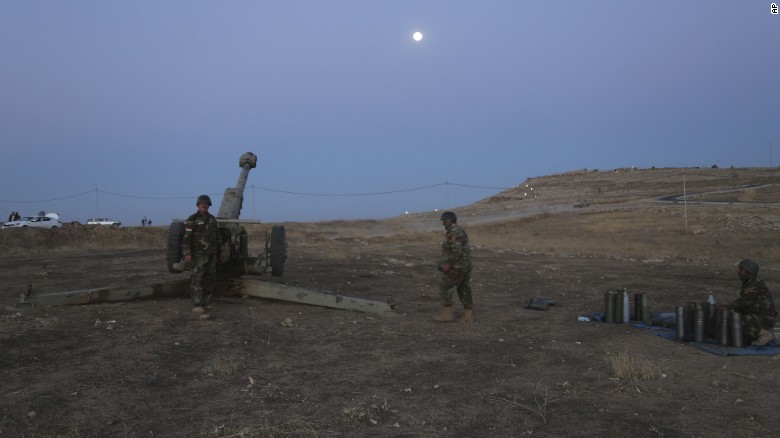
Washington – While the Pentagon emphasizes Iraqi forces are leading the charge into Mosul, it is clear US troops will be heavily involved in the efforts to wrest the city back from ISIS.
“Americans are in harm’s way as part of this fight,” Pentagon Press Secretary Peter Cook acknowledged Monday, though he added, “There are specific steps that have been taken, and protocols in place, for us to try and reduce the risk to Americans because this is Iraqis in the lead.”
A day after the assault on Iraq’s second-largest city began, US forces are visibly providing a supporting role to the local troops. Approximately 100 to 200 US Special Operations Forces in northern Iraq are working as advisers to Iraqi and Kurdish Peshmerga units.
A small number of US forces will serve as forward air controllers to call in the locations of ISIS targets for airstrikes. There are also US artillery units at locations both north and south of Mosul that are striking targets.
US Special Forces have the authority to go further into the field than they have in the past to accompany relatively small Iraqi units, but it is not clear that has yet happened in the Mosul battle. US troops are required to stay in positions on the battlefield that provide the least chance of coming under attack.
But despite those restrictions, three US service members have been killed over the past year in operations targeting ISIS in Iraq, and the danger for US troops is likely to grow as the Mosul offensive goes forward.
“They may be as far forward as 500 meters outside the range of small arms, but that does expose them to mortar fire. It does expose them to artillery fire,” noted retired US Army Brig. Gen. Mark Kimmitt.
ISIS are believed to have an elaborate network of booby-traps throughout the city to greet Iraqi forces, as well as a network of tunnels — some big enough to ride a motorcycle through.
Iraqi forces have come a long way from their loss of Ramadi in western Anbar province in May 2015, when Defense Secretary Ash Carter told CNN that Iraqi forces showed “no will to fight” in Ramadi.
Following a later offensive that dislodged ISIS from Ramadi, Iraqi forces also took back the key cities of Fallujah, Baiji and others on the march closer to Mosul — ISIS’ largest remaining Iraqi stronghold and home to over a million people.
But even if ISIS loses its grip on Mosul, analysts who follow the situation say there likely will not be many celebrations in the immediate aftermath.
“There is a lot of fighting left to do,” said retired Lt. Gen. Mark Hertling, a CNN military analyst. “ISIS will still be present, and it will take a generation to get rid of these ideologues.”
And Lt. Gen. Stephen Townsend, the commander of US forces in Iraq and Syria, also signaled Monday that what lay ahead for Iraqi forces in Mosul would not be easy.
“This may prove to be a long, a tough battle, but the Iraqis have prepared for it and we will stand by them,” he said.
As reported by CNN
